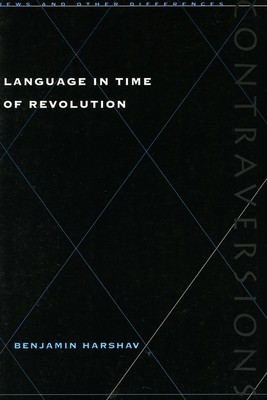
- We will send in 10–14 business days.
- Author: Benjamin Harshav
- Publisher: Stanford University Press
- ISBN-10: 0804735409
- ISBN-13: 9780804735407
- Format: 15.3 x 22.7 x 1.6 cm, softcover
- Language: English
- SAVE -10% with code: EXTRA
Reviews
Description
This book on culture and consciousness in history concerns the worldwide transformations of Jewish culture and society and the revival of the ancient Hebrew language following the waves of pogroms in Russia in 1881, when large numbers of Jews in Eastern and Central Europe redefined their identity as Jews in a new and baffling world.
Reviews
With his customary versatility and lucidity Harshav has given us . . . a host of new and provocative insights into modern Jewish history. . . . This book is an outstanding attempt to juxtapose the revolution in Jewish life with that of the Hebrew language in such a way that each informs our understanding of the other.
--Yosef Hayim Yerushalmi,
Columbia University
It is no small component of Harshav's success in this altogether fascinating book to have made clear the family resemblance between what is still regularly called 'the almost miraculous revival of the Hebrew language' and the coterie movements of European high modernism in both politics and the arts.
--Modernism/Modernity
A wise, original, and stimulating book on the shaping of modern Jewish culture. . . . Humane, deeply erudite, and very satisfying.
--Steven Zipperstein,
Stanford University
Israeli Hebrew, Angel Sáenz-Badillos has written, 'is not the result of natural evolution but of a process without parallel in the development of any other language.' The precise nature of the process is studied in illuminating detail in Language in Time of Revolution.
--London Review of Books
The crisscrossing among the discourses of literature, ideology, history, and linguistics makes for a heady intellectual experience. . . . Harshav writes with great authority and verve. . . . His discussions are a model of clarity.
--Alan Mintz,
Brandeis University
EXTRA 10 % discount with code: EXTRA
The promotion ends in 17d.20:44:11
The discount code is valid when purchasing from 10 €. Discounts do not stack.
- Author: Benjamin Harshav
- Publisher: Stanford University Press
- ISBN-10: 0804735409
- ISBN-13: 9780804735407
- Format: 15.3 x 22.7 x 1.6 cm, softcover
- Language: English English
This book on culture and consciousness in history concerns the worldwide transformations of Jewish culture and society and the revival of the ancient Hebrew language following the waves of pogroms in Russia in 1881, when large numbers of Jews in Eastern and Central Europe redefined their identity as Jews in a new and baffling world.
Reviews
With his customary versatility and lucidity Harshav has given us . . . a host of new and provocative insights into modern Jewish history. . . . This book is an outstanding attempt to juxtapose the revolution in Jewish life with that of the Hebrew language in such a way that each informs our understanding of the other.
--Yosef Hayim Yerushalmi,
Columbia University
It is no small component of Harshav's success in this altogether fascinating book to have made clear the family resemblance between what is still regularly called 'the almost miraculous revival of the Hebrew language' and the coterie movements of European high modernism in both politics and the arts.
--Modernism/Modernity
A wise, original, and stimulating book on the shaping of modern Jewish culture. . . . Humane, deeply erudite, and very satisfying.
--Steven Zipperstein,
Stanford University
Israeli Hebrew, Angel Sáenz-Badillos has written, 'is not the result of natural evolution but of a process without parallel in the development of any other language.' The precise nature of the process is studied in illuminating detail in Language in Time of Revolution.
--London Review of Books
The crisscrossing among the discourses of literature, ideology, history, and linguistics makes for a heady intellectual experience. . . . Harshav writes with great authority and verve. . . . His discussions are a model of clarity.
--Alan Mintz,
Brandeis University


Reviews